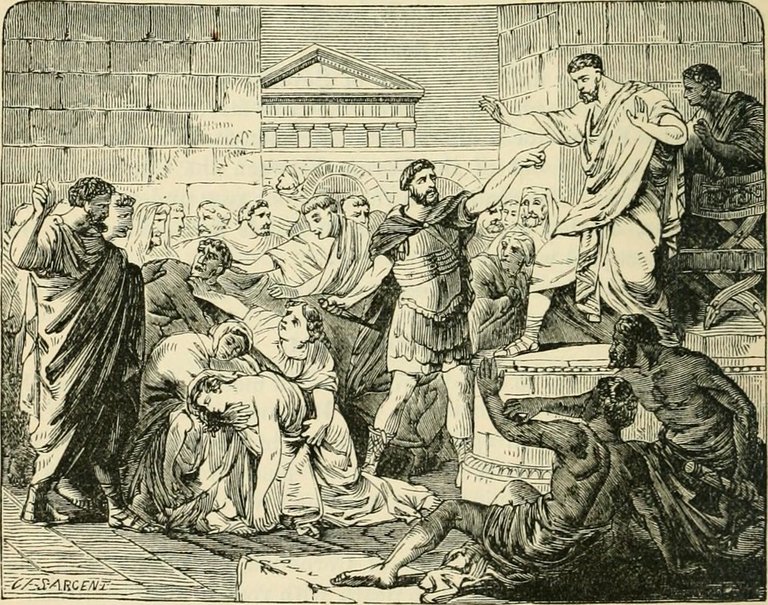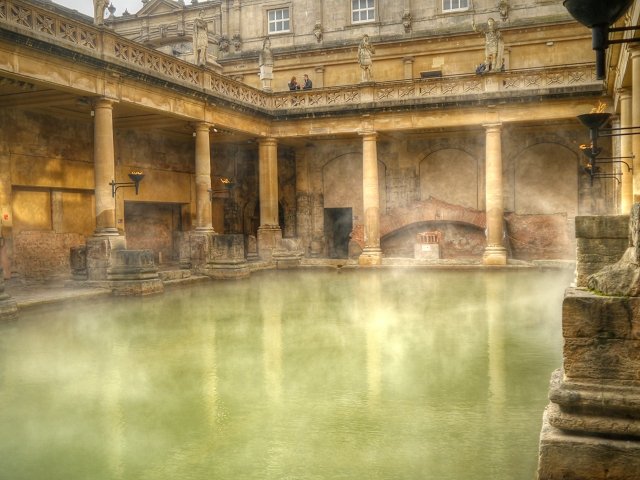
The era that has long been known as the "Roman Empire" is one of the most popular historical times in the world.
And while we know a great deal about the works and the days of the Romans, there are things that go beyond the usual representations of the empire.
The culture of the Romans and their habit of keeping detailed records constantly bring new facts to light about their everyday life, which, as long as one discovers them, is impressed.
So let's look at a series of events about the everyday of an undoubtedly particular society …
Phallus
Fact: The Romans wore Phalluses as amulets ,
The Romans were many things - civilized, powerful, law abiding - but they were also quite superstitious. In order to exorcise the evil of their world, they had amulets, many amulets, with the amulet for luck to being a phallus. The phallic symbolism even played a special role in the Roman daily routine, with citizens wearing amulets with phalluses, hanging them on their doorsteps, and even melodies made of phallus to rid the evil spirits. The phallus was used even for decorative purposes, with the phallic melodies completing the image of either a lion's foot or sometimes a bird's wings ...
Shopping malls
Fact: The Romans "discovered" the concept of a shopping mall
Trajan's market was a colossal open-air construction in ancient Rome that played the role of a concept that was mainly linked to the 20th century: it was indeed a huge shopping mall! The two-story building was located in the center of the area, which was once the main city of Rome, and accommodated about 150 different shops, with Roman citizens enjoying here goods that were transported from every corner of the empire ...
Gladiator Blood
Fact: The Romans drank gladiator blood
Medically speaking, Roman society was far ahead of its time, but that does not mean that it was totally free of the prejudices and empirical knowledge of the past. It was therefore believed that the blood of the gladiators could heal epilepsy,give power and strengh with that belief that the blood of the wicked wrestlers would become highly desired. The situation was so much out of control that when the dead body of the gladiator was moving away from the arena, his hot blood was an object of buying and selling ...
Left handed
Fact: The left-handed men were treated with bias
The left-handers did not have the best fortune in history, so it was in Roman times. The left-handed man was considered unreliable and unfortunate,society faced them with negativity and prejudice. The only well-known area left-handed enjoyed was the arena, with left-handed gladiators and their "strange" fight style to make the fight (even more) interesting ...
Urination
Fact:The Romans conceived a special tax measure, the " urination tax"
The Romans' habit of recording everything and keeping exhaustive and detailed records, compared to other ancient civilizations, enables us to get to know them better. It was in the 1st century AD. when Emperor Vespasian inaugurated a strange tax measure that would be known as the "urination tax"! It was not addressed to citizens, but to business people in the public urinal, since it was a place of trading.
Urine ammonia was used in pharmaceutical formulations and mainly in bleaching the laundry, with urinary owners trading the urine as a commodity and making good money. Like the tax on tobacco or the tax on alcohol, the tax in urine had its practical explanation …
Bandages
Fact: They were making spider web bandages …
Roman society was at the forefront of medical research, with numerous discoveries and contributions to the advancement of knowledge. The Romans literally made wonders in wound healing, inaugurating something that would become a common medical site since then: the bandage!
Doctors of Roman legions used to treat the wounds of warriors with a mixture of honey, vinegar and spider webs !With the "silk" of the tissue functioning as a dressing. Recent research into spider tissues has revealed that, beyond their antibacterial action, in terms of weight and strength, the tissue is even stronger than steel ...
Bathrooms
Fact: The Romans discovered the cisterns…
The innovations introduced by the Romans into the drainage system are more or less famous. It was one of the first historical examples of civilizations that used groundwater to wash out their waste, but the extent to which they developed the thing is not so well-known. The Roman society therefore had modern comforts, such as internal toilets and plumbing facilities, but only to the highest socio-economic strata. The wealthy Roman citizen enjoyed cold and warm water in his bathroom, as well as toilets that were mechanically cleaned from the droppings. The progress of the Roman everyday life in the hygiene sector does not have a similarity in the history ...
Crucifixion :
Crucifixion was not about Roman citizens
We all know that crucifixion was a common way of punishment at the time of the Roman Empire, but it did not concern the citizens themselves (unless they were betrayers).
If the citizen of Rome committed an offense, no matter what his nature, the penalties imposed on him were a fine or exile. But if a non-citizen of Rome violated the Roman Code of Criminal Procedure, even for minor offenses, there was a good chance of facing the cross ...
Aliens
Fact: The Romans recorded some of the first "documents" for the existence of extraterrestrial life….
It could be claimed that the Romans "discovered" the aliens, at least at the level of written monuments. The earliest written reference to extraterrestrial life comes from a Roman record of 218 BC, which states that a fleet of glittering vessels appeared to sail in the sky of Rome!





